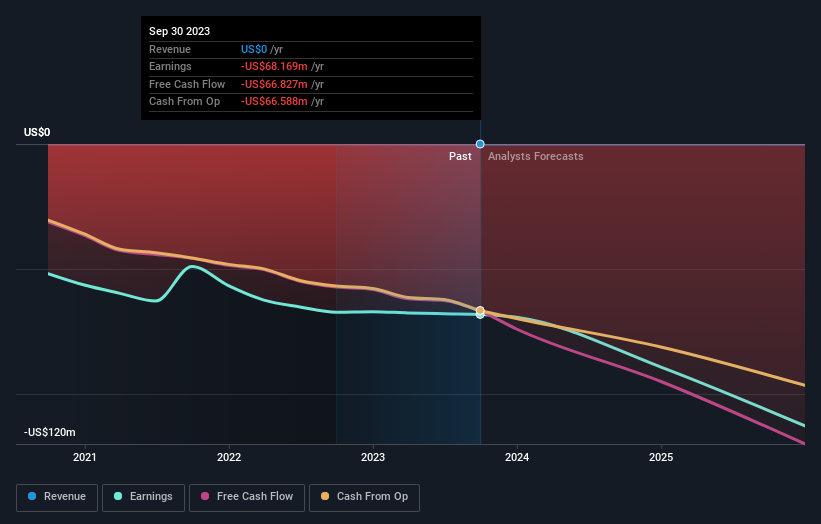Institutional investors own a significant stake of 45% in Inozyme Pharma, Inc. (NASDAQ:INZY)
Key Insights
Given the large stake in the stock by institutions, Inozyme Pharma's stock price might be vulnerable to their trading decisions
53% of the business is held by the top 8 shareholders
Ownership research along with analyst forecasts data help provide a good understanding of opportunities in a stock
Every investor in Inozyme Pharma, Inc. (NASDAQ:INZY) should be aware of the most powerful shareholder groups. The group holding the most number of shares in the company, around 45% to be precise, is institutions. Put another way, the group faces the maximum upside potential (or downside risk).
Given the vast amount of money and research capacities at their disposal, institutional ownership tends to carry a lot of weight, especially with individual investors. Hence, having a considerable amount of institutional money invested in a company is often regarded as a desirable trait.
Let's take a closer look to see what the different types of shareholders can tell us about Inozyme Pharma.
Check out our latest analysis for Inozyme Pharma
What Does The Institutional Ownership Tell Us About Inozyme Pharma?
Institutions typically measure themselves against a benchmark when reporting to their own investors, so they often become more enthusiastic about a stock once it's included in a major index. We would expect most companies to have some institutions on the register, especially if they are growing.
We can see that Inozyme Pharma does have institutional investors; and they hold a good portion of the company's stock. This implies the analysts working for those institutions have looked at the stock and they like it. But just like anyone else, they could be wrong. It is not uncommon to see a big share price drop if two large institutional investors try to sell out of a stock at the same time. So it is worth checking the past earnings trajectory of Inozyme Pharma, (below). Of course, keep in mind that there are other factors to consider, too.
It looks like hedge funds own 20% of Inozyme Pharma shares. That worth noting, since hedge funds are often quite active investors, who may try to influence management. Many want to see value creation (and a higher share price) in the short term or medium term. Longitude Capital Management Co., LLC is currently the company's largest shareholder with 9.5% of shares outstanding. Adage Capital Management, L.P. is the second largest shareholder owning 9.0% of common stock, and Pivotal BioVenture Partners LLC holds about 7.3% of the company stock.
We also observed that the top 8 shareholders account for more than half of the share register, with a few smaller shareholders to balance the interests of the larger ones to a certain extent.
While studying institutional ownership for a company can add value to your research, it is also a good practice to research analyst recommendations to get a deeper understand of a stock's expected performance. There are plenty of analysts covering the stock, so it might be worth seeing what they are forecasting, too.
Insider Ownership Of Inozyme Pharma
The definition of an insider can differ slightly between different countries, but members of the board of directors always count. The company management answer to the board and the latter should represent the interests of shareholders. Notably, sometimes top-level managers are on the board themselves.
Most consider insider ownership a positive because it can indicate the board is well aligned with other shareholders. However, on some occasions too much power is concentrated within this group.
Our information suggests that Inozyme Pharma, Inc. insiders own under 1% of the company. It appears that the board holds about US$2.5m worth of stock. This compares to a market capitalization of US$259m. We generally like to see a board more invested. However it might be worth checking if those insiders have been buying.
General Public Ownership
With a 10% ownership, the general public, mostly comprising of individual investors, have some degree of sway over Inozyme Pharma. This size of ownership, while considerable, may not be enough to change company policy if the decision is not in sync with other large shareholders.
Private Equity Ownership
Private equity firms hold a 24% stake in Inozyme Pharma. This suggests they can be influential in key policy decisions. Some investors might be encouraged by this, since private equity are sometimes able to encourage strategies that help the market see the value in the company. Alternatively, those holders might be exiting the investment after taking it public.
Next Steps:
It's always worth thinking about the different groups who own shares in a company. But to understand Inozyme Pharma better, we need to consider many other factors. Consider for instance, the ever-present spectre of investment risk. We've identified 5 warning signs with Inozyme Pharma (at least 3 which shouldn't be ignored) , and understanding them should be part of your investment process.
Ultimately the future is most important. You can access this free report on analyst forecasts for the company.
NB: Figures in this article are calculated using data from the last twelve months, which refer to the 12-month period ending on the last date of the month the financial statement is dated. This may not be consistent with full year annual report figures.
Have feedback on this article? Concerned about the content? Get in touch with us directly. Alternatively, email editorial-team (at) simplywallst.com.
This article by Simply Wall St is general in nature. We provide commentary based on historical data and analyst forecasts only using an unbiased methodology and our articles are not intended to be financial advice. It does not constitute a recommendation to buy or sell any stock, and does not take account of your objectives, or your financial situation. We aim to bring you long-term focused analysis driven by fundamental data. Note that our analysis may not factor in the latest price-sensitive company announcements or qualitative material. Simply Wall St has no position in any stocks mentioned.


